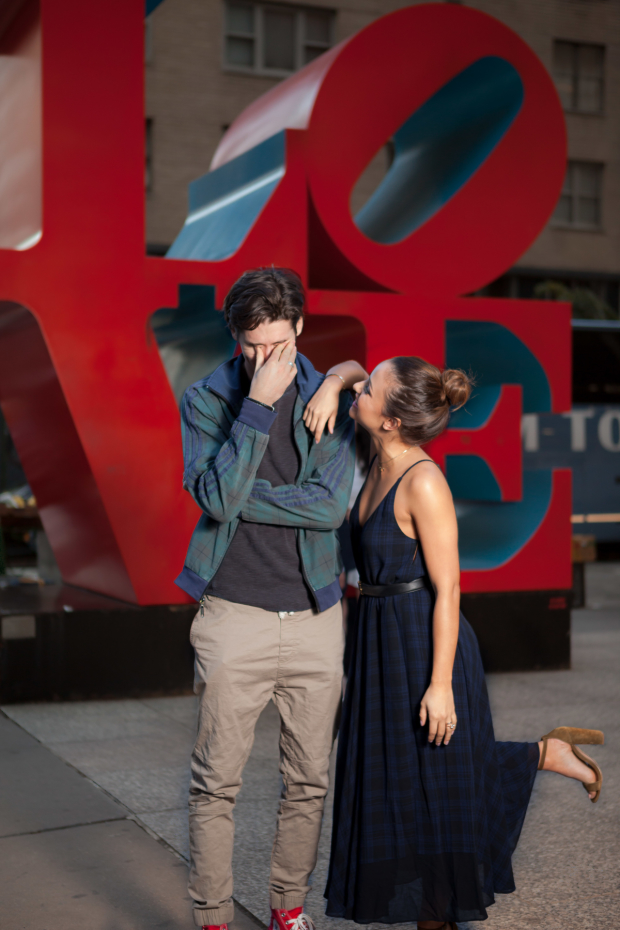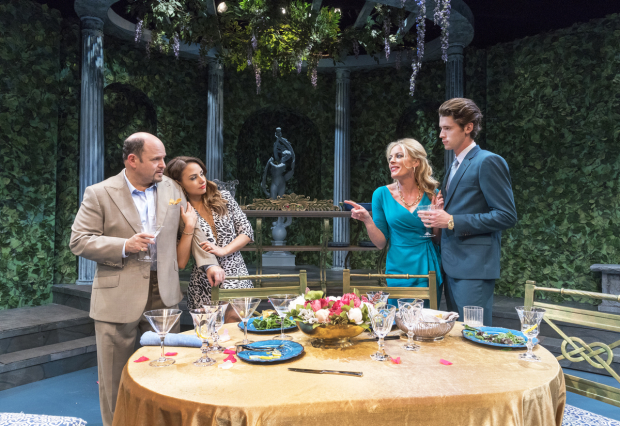The Millennials of The Portuguese Kid Talk Love and Marriage
Aimee Carrero and Pico Alexander represent the youngest generation in John Patrick Shanley’s modern-day romantic comedy.
"I got no quarrel with that."
That was John Patrick Shanley's only note for Aimee Carrero and Pico Alexander after hearing them read together as Patty Dragonetti and Freddie Imbrossi, the younger half of the combative romantic equation in his new comedy The Portuguese Kid, now making its world premiere at the Manhattan Theatre Club.
For much of Shanley's play, millennial exes Patty and Freddie stay in their separate corners with their new, older lovers: Patty married to wealthy lawyer Barry Dragonetti (Jason Alexander), who is perpetually recovering from an emasculating encounter with a mugger — and Freddie mid-tryst with the newly widowed Atalanta Lagana (Sherie Rene Scott), the woman who triggered Barry's feelings of inadequacy by saving him from said mugger. But the inevitable game of trading partners ensues as the members of this mismatched quartet reexamine the kind of love story they want their lives to tell.
For Shanley, that story is never a tranquil one, but filled with enough poetry for Carrero and Alexander to sink their theatrical teeth into. Carrero returns to the stage for the first time since 2012 (What Rhymes With America), after which she landed a regular role on the Freeform sitcom Young & Hungry, which has kept her busy for five seasons and counting. For Alexander, this marks his third off-Broadway role (Punk Rock in 2014 and What I Did Last Summer in 2015), but he may soon be most recognizable as Reese Witherspoon's love interest in the film Home Again, which was released just as The Portuguese Kid got into the thick of rehearsals.
Still breathing the air of the playwright's romantic musings after a performance, Carrero and Alexander kept the conversation going while taking in some LOVE on 55th Street.

(© Seth Walters)
What has it been like for the two of you to work on a brand new John Patrick Shanley play?
Aimee Carrero: It's a dream come true. I love Shanley. He's my favorite living playwright. In any acting class, one of the first scenes you do is something from Danny and the Deep Blue Sea or something from The Dreamer Examines His Pillow. It's been amazing to work with him.
Pico Alexander: He's got a way with words. When I went into this rehearsal process, I remember saying to myself, "This is just gonna be a fun night at the theater. If someone can come out of the show and go, 'Ay! Let's go get some meatballs!', we'll have accomplished our mission." And then when we started working on it, we realized that there's actually a very deep underbelly here. Ninety percent of the iceberg is underwater.
A big part of that iceberg is made up of different ideas about romantic relationships. What kinds of beliefs do your characters, Patty and Freddie, have about love? Do you think their age has an effect on that?
Aimee: I wouldn't want to have Patty's relationship with Freddie, but I think in Shanley's mind, the best kind of love is the love that makes you feel like sh*t and feel amazing all at once. And I think a lot of people in their 20s feel that way.
Pico: When you're growing up, you feel like love is real and you're gonna find that soulmate and live happily ever after. Then you start getting hurt and you start doubting it. We see what happens to Atalanta and Barry. They become bitter because they compromise early on. I think that's where Freddie is, and I think that's where Patty is too. Love isn't real — it's not possible — it's not practical. And yet they just keep coming back to it, because there is something about Patty for Freddie.
Aimee: And there's something about Freddie for Patty. Hopefully one day they'll learn how to treat each other and that relationship will be so boring that nobody will want to write a play about it.

(© Richard Termine)
What do you think is holding all of these characters back from the love they want?
Aimee: If Patty was a friend of mine, what I would say is, you have to stop looking for happiness in other people. She always says, "Somebody has to look out for me." Sorry to break it to you, girlfriend, that's gotta be you. When I first read it, I thought, "This is a play about identity and about the inevitability of being the person we are whether we like that person or we don't." Life will reveal that to you over and over and over again until you finally cannot run away from it.
Pico: While the girls may vocalize the fact that they don't know who they are, the men are going through the same experience. They're just too bullheaded to admit it or say it out loud.
Aimee: Freddie thinks he's a dick. He's not a dick, he's a poet. Barry thinks he's a f**king wise guy from the streets. No, he's a "forest creature."
Pico: That's Barry's whole complex. We have this idea that when a man and a woman are walking down the street and some dude comes up to them and mugs them, the man is gonna be the one that stands up for the woman and defends her. Barry's not that guy. Atalanta is that woman. He thinks he's weak because of it, and she thinks that she's twisted because of it. That's not the case.
Do you think Patty and Freddie's generation of twentysomethings are internalizing that faster than Barry and Atalanta's generation — or even the generation before them that we see in Barry's mother, Mrs. Dragonetti (played by Mary Testa)?
Pico: We are a bit of a ways away. We're getting there.
Aimee: Mrs. Dragonetti's generation marched for equal rights. My generation is marching for something else. As a woman, there is a part of me that feels unresolved. I think, "What should I want? What do I want? How should I ask for it?" And that's what Atalanta and Patty touch on. Patty is trying to make herself believe that she can be a trophy wife, that somebody else can give her fulfillment and happiness. That's not true. I'm hoping people will come to laugh but still walk away thinking, "Let me take a look at myself in the mirror. Who do I say that I am and who am I actually?"

(© Seth Walters)








